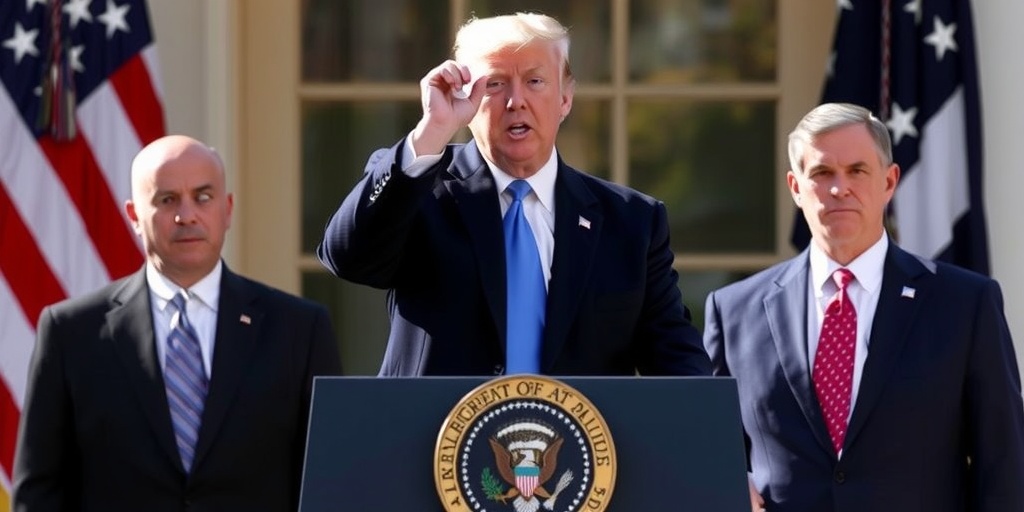Now Reading: Doug Emhoff’s Law Firm Reportedly Next Target of Trump
-
01
Doug Emhoff’s Law Firm Reportedly Next Target of Trump
Doug Emhoff’s Law Firm Reportedly Next Target of Trump

Headline: Trump’s Targeted Punishment: Law Firm Connected to Doug Emhoff in the Crosshairs
In a significant development that underscores the ongoing tensions in American politics, the law firm employing Doug Emhoff, who is the spouse of former Vice President Kamala Harris, has been identified as one of the firms that former President Donald Trump aims to penalize. This revelation comes from four individuals who were briefed about the situation but wished to remain anonymous due to the confidential nature of the discussions.
The firm, Willkie Farr & Gallagher, has found itself under scrutiny not only because of its connection to Emhoff but also due to its association with high-profile legal figures involved in crucial investigations concerning Trump. Among these figures is a top investigator implicated in the congressional inquiry that meticulously outlined Trump’s actions leading up to the January 6, 2021, insurrection at the U.S. Capitol. Additionally, a prominent litigator from the firm played a pivotal role in a lawsuit brought forth by two Georgia election workers against Rudy Giuliani. Giuliani was ultimately deemed to have defamed the women in his attempts to assist Trump in delegitimizing their electoral victory in the 2020 presidential election, resulting in a staggering $148 million judgment against him.
Mr. Trump, since returning to position of power, has made headlines by issuing executive orders that specifically target law firms and their employees whom he perceives as adversaries. The precise strategy Willkie Farr & Gallagher intends to adopt in response to these looming orders remains ambiguous, leaving many to speculate on the potential ramifications for both the firm and its considerable client base.
Several other law firms have faced similar executive actions from Trump, with some opting for negotiation to safeguard their interests. Reports indicate that these firms entered into agreements with Trump in exchange for the mitigation or cancellation of executive orders, drawing criticism from various quarters who argue that such capitulations to Trump’s tactics reflect a troubling precedent of intimidation by powerful political figures.
In contrast, a group of three law firms that challenged Trump’s orders legally found themselves facing swift action, as they were granted restraining orders by the courts. These judges expressed their astonishment at the nature of Trump’s orders, articulating concerns that they may infringe upon constitutional rights.
Despite the legal pushback, Trump appears to remain steadfast, unapologetically continuing his campaign of retribution against the firms he perceives as obstructive or disloyal. Recently, he has boasted about his efforts, claiming that a growing number of firms are seeking to make arrangements with him to avoid potential fallout.
As discussions surrounding Willkie Farr & Gallagher unfold, it’s worth mentioning that the firm had made headlines earlier this year regarding its strategic hiring decisions. Just a week after Trump took office, the firm announced that it had secured the services of Doug Emhoff, who previously worked in a lucrative practice before making the move to public service alongside Harris.
In 2023, the firm reinforced its standing by hiring Tim Heaphy, who had served as the chief investigative counsel for the House select committee that probed the January 6 attack. Heaphy’s role was pivotal as he conducted numerous key interviews and provided critical information that shaped the committee’s findings during its highly publicized hearings.
Notably, despite the firm’s connections to Trump’s perceived adversaries, it has a historical relationship with him that dates back to the 1990s when it represented Trump during a significant bankruptcy proceeding. Moreover, Willkie Farr & Gallagher also successfully defended Trump ally Thomas Barrack, securing his acquittal in a federal case in 2022. Additionally, the firm represents X, the social media platform owned by prominent presidential advisor Elon Musk.
As the story continues to develop, the implications of Trump’s actions against Willkie Farr & Gallagher and potentially other firms speak to a broader narrative about political power, influence, and the legal landscape within which these influential law firms operate. The outcomes of this unfolding situation may have lasting impacts not only on the firms involved but also on the trajectory of political and legal interactions in the United States as parties navigate the complexities of alliances and enmities within the current power structure.
Stay Informed With the Latest & Most Important News
Previous Post
Next Post
-
 01New technology breakthrough has everyone talking right now
01New technology breakthrough has everyone talking right now -
 02Unbelievable life hack everyone needs to try today
02Unbelievable life hack everyone needs to try today -
 03Fascinating discovery found buried deep beneath the ocean
03Fascinating discovery found buried deep beneath the ocean -
 04Man invents genius device that solves everyday problems
04Man invents genius device that solves everyday problems -
 05Shocking discovery that changes what we know forever
05Shocking discovery that changes what we know forever -
 06Internet goes wild over celebrity’s unexpected fashion choice
06Internet goes wild over celebrity’s unexpected fashion choice -
 07Rare animal sighting stuns scientists and wildlife lovers
07Rare animal sighting stuns scientists and wildlife lovers





















